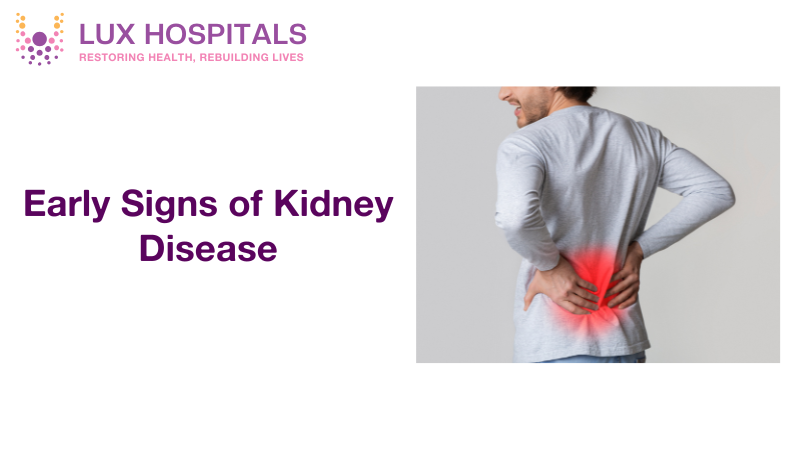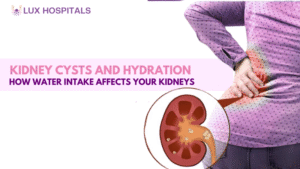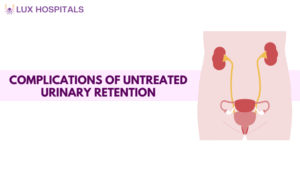10 Warning Signs of Kidney Disease in Early Stages

Kidneys remove waste and excess water from the blood, regulate electrolyte balance, and control blood pressure. Kidney disease usually progresses quietly with subtle symptoms that are not noticed until extensive damage has been done. Early warning signs of kidney disease must be detected to allow early intervention and proper management.
The following are ten warning signs that can signal kidney disease
1. Weakness and Fatigue
Persistent weakness or fatigue can indicate kidney disease. When the kidneys cannot filter waste and toxins out of the blood, it results in an accumulation that can make a person feel fatigued. Kidney disease can also result in anemia, which generates prolonged fatigue.
2. Alteration in Urination Pattern
Changes in the urination process, including frequency, reduction of output, frothy urine, or the inability to urinate, maybe some of the earliest signs of kidney disease. You have to see a physician if you spot blood in your urine or have pain while urinating.
3. Swelling of Hands, Feet, and Ankles
One of kidney disease’s most non-specific signs and symptoms is edema caused by fluid retention. When kidney function decreases, excess water and sodium build up in the body, causing swelling in the extremities.
4. Unexplained High Blood Pressure
The kidneys maintain blood pressure through the regulation of fluid and hormonal secretion. Increased blood pressure is a possible indicator of kidney disease at an early stage, meaning that the kidneys cannot control in time.
5. Shortness of Breath
Kidney disease can result in lung congestion of fluid and, hence, shortness of breath. Secondarily, a decreased oxygen-carrying capacity due to anemia may also contribute to breathlessness after minimal effort.
6. Chronic Itching and Skin Issues
Itching and dryness of the skin may happen when kidney function is impaired, building up waste products in the blood. These are usually related to mineral and bone disease of chronic kidney disease.
7. Loss of Appetite and Nausea
Renal failure-induced toxic accumulation in the body can cause gastrointestinal symptoms as nausea, vomiting, and appetite loss. Patients with end-stage renal illness typically exhibit these.
8. Muscle Cramps and Weakness
Decreased kidney function can result in electrolyte disturbances, which can result in muscle cramps and weakness. Decreased calcium and increased phosphorus levels are usually the etiology of muscle pain in patients with renal disease.
9. Trouble Concentrating and Brain Fog
Cognitive impairment, including trouble concentrating and memory loss, may be a sign of kidney disease. They are brought on by either a buildup of toxins in the blood or a reduction in the oxygenation of the brain.
10. Puffy Eyes and Facial Swelling
Protein leakage in urine, a condition known as proteinuria, is an early sign of kidney disease. It often manifests as puffiness around the eyes and swelling in the face, indicating that the kidneys are not functioning properly.
Who is at Risk?
Specific individuals are at a higher risk of developing kidney disease, including:
- People with diabetes or hypertension
- Individuals with a family history of kidney disease
- Those over the age of 60
Particular symptoms of kidney illness in women, such as hormonal imbalances or urinary tract infections
When to See a Doctor
Early detection of the signs of kidney disease can greatly improve treatment and delay the progression of the disease. Healthy living, adequate hydration, and control of any underlying medical condition can all be beneficial in keeping kidneys healthy. If you see any early indicators of kidney illness, see a healthcare professional for appropriate assessment and treatment.
Conclusion
The progression of kidney disease can be slowed, and treatment outcomes are greatly improved by early detection of symptoms. Maintaining a healthy lifestyle, drinking lots of water, and managing pre-existing medical conditions can help preserve kidney health. For appropriate assessment and treatment, speak with a healthcare provider if you suspect any early symptoms of kidney disease.
Frequently Asked Questions
The first signs of kidney disease often include fatigue, changes in urination patterns, swelling in the hands and feet, high blood pressure, and persistent itching. Early detection is key to managing the condition effectively.
To avoid kidney problems, stay hydrated, eat a balanced diet, limit salt and processed foods, maintain a healthy weight, control blood sugar and blood pressure, avoid excessive painkillers, and get regular check-ups.
Yes, frequent urination, especially at night, can be an early sign of kidney disease. It may indicate that the kidneys are not filtering waste properly, leading to an increased need to urinate.
Back pain can sometimes be associated with kidney disease, particularly if it is due to kidney infections or kidney stones. However, general kidney dysfunction does not typically cause severe back pain.
In the early stages, kidney disease can sometimes be managed, and its progression can be slowed through lifestyle changes, medication, and proper medical care. However, advanced kidney disease often requires dialysis or a kidney transplant.
A diet low in sodium and processed foods and high in fruits, vegetables, and lean proteins can help maintain kidney health. Staying hydrated and avoiding excessive intake of sugary beverages and alcohol also supports kidney function.
Kidney disease is diagnosed through blood tests (to check creatinine and glomerular filtration rate), urine tests (to detect protein leakage), and imaging studies like ultrasounds or CT scans to assess kidney structure.
Unintentional weight loss can occur in later stages of kidney disease due to loss of appetite, nausea, and metabolic imbalances.
Chronic dehydration can strain the kidneys and contribute to kidney disease. Staying hydrated is essential for maintaining kidney function and overall health.
Women may experience symptoms such as urinary tract infections, hormonal imbalances, and swelling in the hands and feet, in addition to general kidney disease symptoms.




















